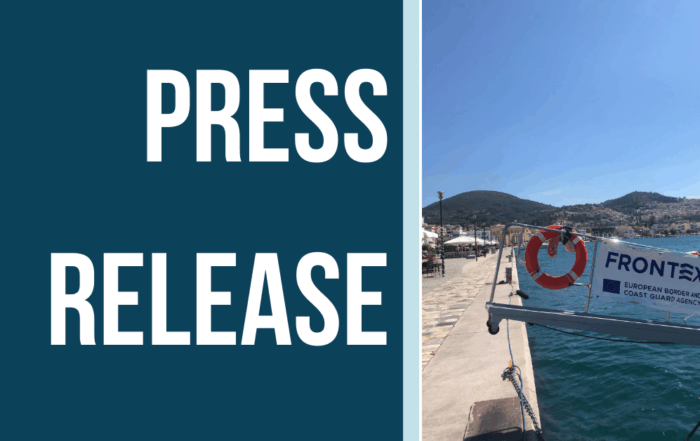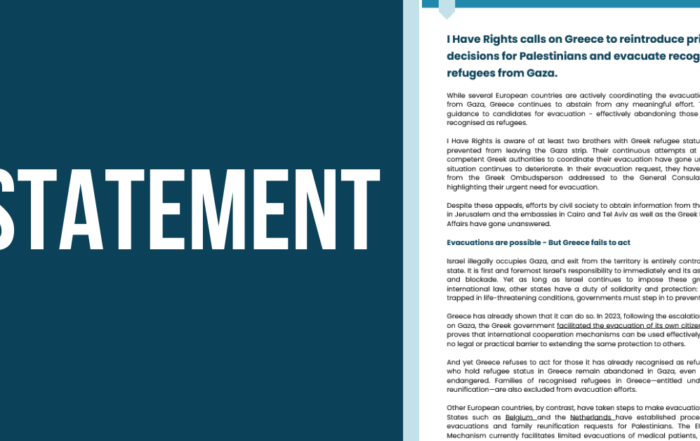Case Study
In an asylum case where I Have Rights provided legal aid, the Greek Appeals Authority ruled that the Regional Asylum Office of Samos failed to consider an asylum seeker’s vulnerability when subjecting her to the accelerated asylum procedure and rejected her claim on credibility grounds. As such, her appeal was accepted, and she was granted subsidiary protection in recognition of the risks she would face if she returned to her country of origin.
On the admissibility of the appeal:
In September 2022, I Have Rights’ (IHR) legal team started to represent a trafficking and gender-based violence survivor from Sierra Leone. The Regional Asylum Office of Samos (RAO Samos) examined her case under the accelerated procedure despite her medical and psychological assessment not being completed. Such assessments are a safeguard put in place to verify whether an asylum seeker is vulnerable and would need additional support and special guarantees during their asylum procedure.
The RAO Samos did not consider her vulnerable, and rejected the applicant’s case on credibility grounds under the accelerated procedure. Her rejection was issued very quickly – within 25 days of her registration as an asylum applicant. She was also given a very tight deadline of 10 days to fight the negative outcome.
During the asylum procedure in the second degree, IHR’s legal team argued and proved that the applicant was indeed a vulnerable person who should have been given the 30-day ordinary procedure deadline in order to be able to better support her asylum case and benefit from the special guarantees that are provided for by the Greek and European law for vulnerable asylum seekers.
“Such a deadline was necessary in order to have effective and fair access to asylum procedures, and I am glad the appeal authorities recognised that, but this is an individual case and the problem is systemic” explains Stavroula Georgaliou, lawyer at IHR. “Because of how the procedure works, I am sure that many vulnerable asylum seekers do not get to fight unfair rejections when being placed under the accelerated procedure. There is often not enough time to collect evidence and support the case properly.”.
The Greek Appeals Authority (GAA) accepted the applicant’s appeal as admissible and timely, even though it was submitted after the 10-day accelerated procedure deadline and ruled that the RAO Samos should have waited for the completion of the vulnerability assessment before issuing an asylum decision, especially because there was evidence of the applicant’s vulnerability. Indeed, an official psychosocial evaluation of the National Public Health Organization of Greece identified the applicant as a trafficking and gender-based violence survivor. The GAA ruled that the RAO Samos failed to take into consideration the existing evidence regarding the applicant’s vulnerability and failed to exempt her from the accelerated procedure.
On the basis of the asylum claim
IHR’s legal team argued that based on the applicant’s profile, there is reasonable fear of persecution. Indeed, the applicant is part of a special social group and should obtain international protection on the basis of well funded fear of being re-trafficked, being subjected to Female Genital Mutilation (FGM), and/or face cruel, inhuman and degrading treatment.
“We are relieved the Appeals Authority took into account how the intersectionality of her vulnerabilities put her at risk if she was required to return to Sierra Leone,” explains Ella Dodd, Legal Coordinator at IHR, “the Samos RAO had completely disregarded her personal circumstances. While eventually her experiences as a survivor of trafficking was recognised at second instance, the RAOs must do more to recognise and support survivors at first instance.”
The GAA overruled the decision of the RAO Samos and found that her personal circumstances qualified her for subsidiary protection. The risk of being subjected to FGM, as well as her socioeconomic situation as a young single woman with no work experience and no support network were all factored in the decision. Moreover, as a survivor of a traumatic trafficking experience, she could be exposed to treatment that is contrary to the prohibition of torture and inhuman treatment as provided for by article 3 of the European Convention of Human Rights. She could also be subjected to unjustifiably cruel living conditions, due to the lack of state protection and effective medical care, as well as the existence of food insecurity in her country of origin.
The legal support offered to the applicant was provided along with a submission which was sent by IHR to the UN Special Rapporteur on trafficking in persons regarding Greece’s failure to comply with its obligations under European and International law, namely with:
- The 2000 UN Protocol to Prevent, Suppress and Punish Trafficking in Persons (Palermo Protocol),
- The European Convention for the Prevention of Torture and Inhuman or Degrading Treatment or Punishment
- The 2011/36/EU Directive and the impact on survivors accommodated in the Closed Controlled Access Center in Samos.
As the Northern Aegean islands are an entry point into the European Union for many asylum seekers, the identification of survivors of human trafficking early in the asylum process is paramount. During the course of our work over the last 12 months we have assisted 47 persons who are survivors of human trafficking. It is our experience that the Greek authorities, like in this case, often fail to meet their obligations towards survivors of human trafficking.
Press release: Submission to the European Commission for the Have Your Say initiative on the Frontex Recast Regulation.
I HAVE RIGHTS’ Advocacy Taskforce submitted feedback to the European Commission regarding the Recast Regulation on the European Border and [...]
I Have Rights calls on Greece to reintroduce prima facie decisions for Palestinians and evacuate recognised refugees from Gaza.
While several European countries are actively coordinating the evacuation of Palestinians from Gaza, Greece continues to abstain from any meaningful effort. [...]
Press release: The Greek Ombusdperson finds it imperative that vulnerable persons be transferred to mainland facilities in accordance with Greek law.
Following a joint complaint made earlier by Samos-based organisations, the Greek Ombudsperson, on the 1st of August, found it imperative that [...]




Leave A Comment
You must be logged in to post a comment.